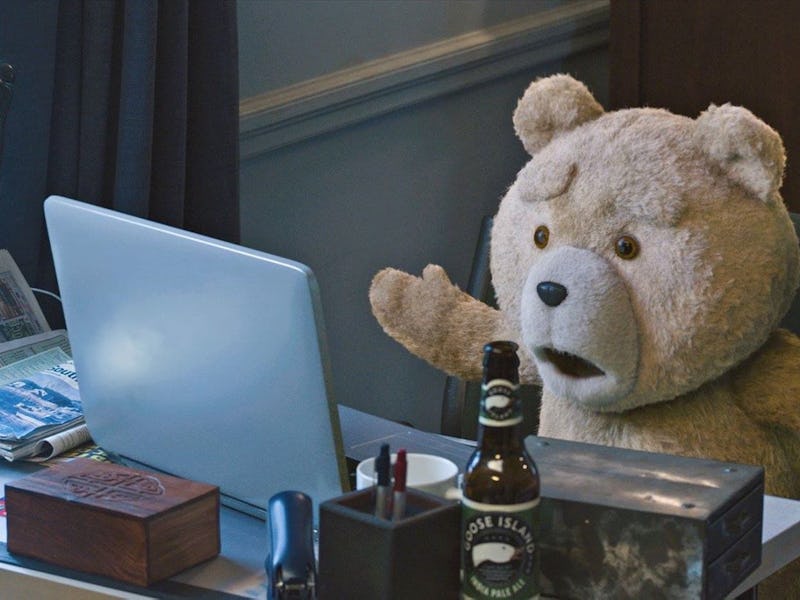The R-Rated Comedy Is Making a Comeback
Freedom to fart, felch and... have fun.

Your options at the multiplex this summer aren’t limited to superheroes and dinosaurs. Although it may seem that way, there are a clutch of films targeted specifically at an adult audience - and we’re not talking intense dramas or corset-clad period pieces. We mean comedies. Ripe with vulgarity, cussing, and content that’s generally deemed too mature for the sensitive, impressionable eyes of the young. Full-blown (sometimes literally) R-rated comedy is making a huge comeback after taking a brief sabbatical in the nineties. By the end of this summer, we will have been offered several options for at the cinema: the espionage caper Spy, anthropomorphic sequel Ted 2 and ‘80s reboot-sequel Vacation.
Their marquee presence is a result of groundwork laid by the Judd Apatow-inspired Frat Pack, who dominated the field in the noughties. That group of directors, producers and actors lowered the taste bar in 2005’s The 40-Year Old Virgin. The up-and-coming director secured an impressive cast to star in a movie about a protagonist whose “hero’s journey” consists of getting laid. It’s hardly highbrow, but the Frat Pack brand of base comedy hijinks has consistently been an easy target for detractors. It’s too crude, it’s too silly and there’s too much swearing. But isn’t that how adults have a tendency to behave when they cut loose? That reason, in part, has led to the resurgence of comedies aimed squarely at adults. And the fact that it grossed $177 million worldwide on a budget of $26 million.
In the years following, Knocked Up, Pineapple Express, The Hangover, Superbad, Forgetting Sarah Marshall, This Is The End, Horrible Bosses, We’re The Millers and the like, all prescribed to that same formula of smart, knowing subtext and lewd slapstick shenanigans of adults trying to suss out life.
While the majority of those titles placed men at the center of their stories, the supporting female roles scattering the periphery are largely offered the same treatment. Certainly Katherine Heigl’s baby mama in Knocked Up throws the “grow up” card at Seth Rogen’s stoner - but for the most part, women in the Frat Pack-verse are extended that same opportunity to you know, be funny. Because Jane Lynch, Leslie Mann and Elizabeth Banks’ characters in The 40-Year Old Virgin provide a bulk of the film’s laugh-out-loud moments, paving the way for entirely female-led R-rated comedies. Bridesmaids scored big at the box office, netting $288 million worldwide with a roster of headlining actresses who all discuss sex, vomit, and shit their pants, and get hammered. Just like the guys do.
And while there are only so many times a genre can return to the same well - horror’s never-ending supply of unkillable villains a prime example - the R-rated chucklefest has evolved somewhat. This summer’s Spy, another collaboration between Paul Feig and Melissa McCarthy, ups the stakes by giving McCarthy a rounded character to navigate through espionage territory. The female, often scuttled away into the role of girlfriend, wife or mother, instead takes control of the situation. Male characters’ trajectories and desires are located in domains usually populated by women. There are arguably more avenues to explore - possibly giving another actress the chance to lead, other than McCarthy? - but there’s definite promise in this relatively new terrain.
At first glance, the continued development of R-rated features - regardless of genre - seems to counter Hollywood’s aggressive financial goals. Take a look at the upcoming season of big-hitters set to drop and there are barely any titles proudly celebrating their R-rating. Terminator: Genisys, a reset of the violent, bloody, and terrifying first two movies, is already saddled with low audience expectation due to its terrible trailers. So how does Paramount solve the potential loss of takings? It’s been given a PG-13 rating, in the hopes of recouping its budget and making a tidy sum - even if it’s a critical loser.
The continued production of R-rated comedies bucks that trend. Instead of trying to appeal to as wide a market as possible, studio brass are wising up to the spending potential of targeted demographics. Initial budgets are considerably lower than the average tentpole, understandably so, therefore the pressure to turnaround $500 million in an opening weekend isn’t a concern for a film about people standing around making asses of themselves. Nevertheless, it’s still pleasing to note that there’s at least one area of studio filmmaking where the battle for the family-friendly rating is slightly easier to win for creatives.
Jonathan Goldstein, who co-wrote and directed the Vacation reboot-sequel, even references the artistic freedom he and co-writer-director John Francis Daley were allowed with that red-band rating. “It liberated us, as the R rating does, in some ways, to go further, “ he told IGN. “I think we both feel like it’s a better movie in this form, probably, than it would have been in the original PG-13. We’re pretty happy with that decision.” Same goes for star Ed Helms, who prefers to improvise on set, “It is nice knowing that we’re shooting an R movie, knowing that we don’t have to worry about it, that we can just feel free to get dark or get weird or gross or whatever. I think that just gave everyone a chance to exhale and be like ‘Alright, cool, we can do whatever we want here.’ So I’m thrilled that we wound up as an R movie.”
Ted 2 was automatically given that same freedom. Because the first outing made $550 million worldwide, edging out the likes of Battleship and Snow White and The Huntsman to become Universal’s top-grossing movie of 2012 . ‘If it ain’t broke’ sums up the studio’s approach to the foul-mouthed teddy’s second romp, and their competitors are following in hot pursuit. Speaking of, if that bungled buddy comedy had dropped the obvious minority gags and adopted an R, maybe it wouldn’t have been such a flop.